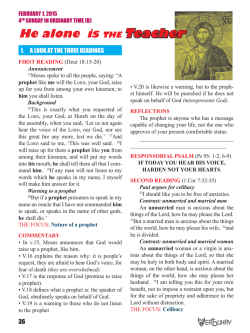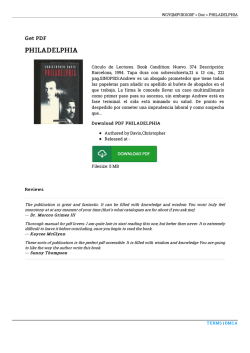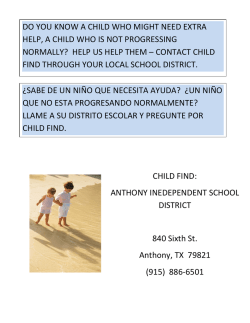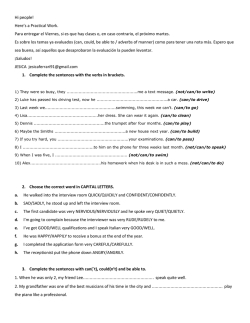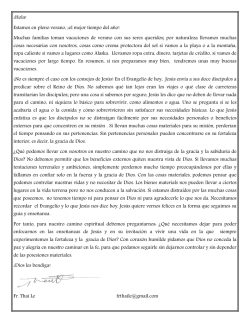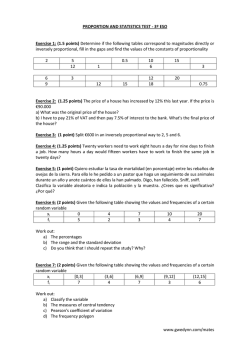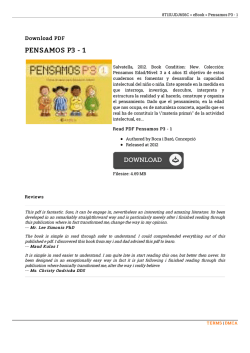
English Newsletter - Mosque Foundation
mada II 1431 Issue 36 W W W. M O S Q U E F O U N D AT I O N . O R G J a n u a ry 2 0 1 7 –R a bi-I I 1 4 3 8 iss u e 1 1 0 Sh. Ahmed Arafat Prophet Muhammad : Message From The Imam A Life of True Worship One of the big problems in the classical works on “Seerah” or the life-story of the prophet is that they do not give an integrated image of the personality of the prophet . They are mainly concerned with the political developments and the different struggles of early Muslims. Many aspects of the character of the prophet are found in the Quran, books of Hadith and Shamael (which covers intricate details of the prophet’s appearance and manners). This short article seeks to shed some light on the prophet’s dedication to worship, which is almost absent in the books of Seerah. Let us take few examples from Quran and Hadith that will help us recognize the heart of Muhammad . (1) The Quran commands the prophet life to worship. to dedicate his Allah commands the prophet “And worship your Lord until death comes to you.” (15: 99) In another position Allah said: “O you who are enwrapped ‘in a mantle’ [out of fear and awe], arise to pray during the night, except for a little ‘of it’. Or ‘pray’ half of it, or lessen the same a little, or add thereto. And ‘therein’ recite the Quran perfectly. For we shall assuredly cast upon you a weighty Word [the Quran]. And, indeed, rising at night ‘for Prayer’ makes for a stronger impression ‘on the soul’, and is best for the recitation ‘of God’s word’. Indeed, during the daytime you shall have lengthy occupations ‘in calling to God’. So remember ‘with praise’ the name of your Lord. Thus shall you devote yourself with ‘sincere’ devotion to Him ‘alone’—the Lord of East and the West. There is no God but Him! So take him ‘alone’ as a guardian.” (73: 1-8) These commands were highly illustrated in the life of the prophet; yet, they are missed in the books of Seerah. (2) To the prophet , Salah was a source of comfort. Abdullah ibn Ash-Shikheer was reported to have said: “I came to the prophet while he was praying, and his chest continue on page 3 PERMIT 107 BRIDGEVIEW, IL 60455 PAID PRESORT STD U.S. POSTAGE continue from page 1 A Life of True Worship MF BOARD OF DIRECTORS 1. Oussama Jammal 2. Safaa Zarzour 3. Abdallah M. Shuaibi 4. Ahmed Kamni 5. Habes Abdallah 6. Banan Said 7. Kalid Baste 8. Aisheh Said 9. Kamal Eldeirawi 10. Jafar Ahmad 11. Jamal Said 12. Jehad Matariyeh 13. Karen Danielson 14. Mohamed Aduib 15. Montaha Salem 16. Muin Abusharara 17. Hussein Ata EDITORIAL BOARD Oussama Jammal Sh. Jamal Said Sh. Ahmed Arafat Tareq Abu-Ammer Aisheh Said Mohamad Chehade Banan Said Abdel Baset Hamayel Ja n u a ry 2 0 1 7 Vol. 06, Issue 110 Copyright © 2015 by The Mosque Foundation. All Rights Reserved. Reproduction without permission is strictly prohibited. Community Pulse is published monthly in the United States by The Mosque Foundation. Editorial and executive offices are located at 7360 W. 93rd Street, Bridgeview, IL 60455. Subscription rates in U.S. and possessions: 1 year (12 issues) FREE. Send address changes to: The Mosque Foundation, 7360 W. 93rd Street. Bridgeview, IL 60455. Printed in U.S.A. 2 January 2017 –Rabi-II 1438 sounded like a boiling kettle.” Salah was the favorite resort for the prophet in many occasions. Whenever the prophet faces any difficult time, he would rush to Salah asking Bilal to call the Athan saying: “Bring comfort to us by ‘calling’ it.” The prophet loved Salah so much that he said about it. “Salah is the pleasure of my eye.” He loved to stand before Allah, praying for a long time. According to Imam al-Bukhari, Ibn Mas’ud said: “I prayed with the prophet one night, and his standing was so long that I thought of something bad! He was asked: “What did you think of? “To sit down and leave him [the prophet ] standing!” replied Ibn Mas’ud. was to Salah despite of his sinThere are many Ahadith that explain how devoted the prophet less life. For instance, Imam Muslim reported on the authority of `Aisha (May Allah be pleased with her) reported: The prophet kept standing (in prayer) so long that the skin of his feet would crack. I asked him: “Why do you do this, while your past and coming sins are forgiven?’’ He said, “Should I not be a grateful servant of Allah?’’ Thus the prophet’s closeness to Allah did not lead him to pride; however, it led him to more humility and worship as a proof of gratitude to Allah. In another Hadith, Aisha, may Allah be pleased with her, described the prophet’s Salah: “Indeed, the prophet used to pray eleven rak’as. This is how he used to pray [at night]. His Sujud would last as long as one of you takes to recite fifty ayat. Thereafter, he would pray two rak’as before Fajr prayer; then, he would lie down on his right side till the Athan for Salah is called” (Reported by al-Bukhari). (3) The prophet had frequent Munajah or intimate conversations with Allah. Ibn Abbas reported that the prophet used to say when waking up for voluntary night prayer:”O Allah, to you is all praise. You are the Sustainer of the heavens and the earth and what is therein. To you is all praise. To You is the kingdom of the heavens and the earth and what is therein. To You is all praise. You are the Light of the heaven and the earth and what is therein. To you is all praise. You are the King of the heavens and the earth. To you is all praise. You are the Truth, Your Promise is the Truth, Your Word is the Truth, Heaven is true, Hell is true, prophets are true, and Muhammad is true. O Allah, to you I submit, in You I believe, on You I put my trust, to You I turn, with Your help I give arguments, and You do I take as a Judge. So forgive my sins past and future, secret and public for no one forgives sins but You.” (Reported by Imam Muslim). (4) The prophet had a heartfelt relation with the Quran. The prophet’s heart was so soft that he would weep whenever he listens to the Quran, especially the ayat that remind him of his prophetic tasks. Ibn Mas’ud said: “The prophet said to me, “Recite the Qur’an for me”. I said, “O Messenger of Allah, shall I recite the Qur’an for you, whereas it has been revealed to you?’’ He replied, “I love to hear from others.” Upon this I started reciting Surat An-Nisa’. When I reached the Ayah:”How [shall it be] then, when We bring from each nation a witness and We bring you [O Muhammad] as a witness against these people?” (4:41) He said, “that is enough”. When I looked at him, his eyes were tearful.” (Narrated by Imam al-Bukhari and Imam Muslim) (5) The prophet used to contemplate on the glory and creations of Allah. Imam al-Bukhari reported that Ibn Abbas said: “While I was staying with my aunt Maymounah, [I noticed that] the prophet spent some time conversing with his family, and then he slept. At the last third of the night, the prophet woke up and looked at the sky and recited: “Indeed, in the creation of the heavens and the earth and the alteration of night and day are signs for those who reflect. Those who remember Allah while standing, sitting and lying down on their sides, and think deeply about the creation of the heavens and the earth, saying: ‘Our Lord, You have not created this in vain. Holy be You. So save us from the torment of the hellfire” (3:190-191). Thereafter, the prophet made Wudu’ and then prayed eleven rak’as. Thereafter this Bilal called the Athan. Then the prophet prayed two rak’as and went out to offer the morning prayer [in congregation] with people.” January 2017 –Rabi-II 1438 (6) The prophet practiced frequent fasts. Here is a list of these fasts. a) All the month of Ramadan, b) All the month of Sha’ban except for few days, c) Mondays Thursdays of each week, By Ahmedand Arafat d) The13th, 14th and 15th of every Hijri month even if he was traveling, e) The 9th of Muharram and the 9th of Thul-Hijjah, f) Al-wisal fasting; that is, to fast successive days without breaking the fast at all. However, the prophet forbade his companions from this kind of fasting, saying: “It is my Lord Who feeds me!” g) Sometimes he would many days in a row for no occasions, and h) Sometimes if he woke up and found no food for breakfast, he would intend fasting that day till sunset. (7) The prophet was a generous giver. Ibn `Abbas reported: “The Messenger of Allah was the most generous of all people; and he was extremely generous during the month of Ramadan when Jibril meets with him. In Ramadan, Jibril used to meet with the prophet every night reciting the Quran to him. During this period, the prophet was more generous than the free-blowing wind!” (8) The prophet practiced I’tikaf (Seclusion or solitude in the Masjid for Worship) as a spiritual vacation. Abu Hurayrah reported: The Prophet used to observe I`tikaf every year (during Ramadan) for ten days. However, in the year when he passed away, he observed I`tikaf for twenty days. [Al-Bukhari]. (9) The prophet was a role model in seeking God’s forgiveness. In his Sahih, Imam Muslim reported, on the authority of al-Aghar al-Muzni that the prophet said: “Sometimes I forget [Thikr of Allah], and I would do Istighfar [asking Allah for forgiveness] more than hundred times a day.” It is noteworthy to mention that the prophet considers his ‘forgetfulness’ as a sin! We all understand that any religious act missed out of ignorance or forgetfulness can be excused or made up. However, because of his higher level of faith, the prophet considered his forgetfulness as a sin that requires Istighfar. Here is an example of the prophet’s Istighfar, usually called Sayyid al-Istighfar (the best form of seeking God’s forgiveness) that shows the prophet’s humility and gratitude and complete reliance on Allah: “O Allah! You are my Lord. No one deserves to be worshipped except You. You created me, and I am Your servant. I will constantly keep my covenant of obeying You and my expectation of getting rewarded by You as much as I could. I seek Your refuge from the evil I did. I acknowledge the blessings You bestowed on me, and I confess my sins to You; So, forgive me for no one forgives sins but You.” (10) The prophet lived in the presence of Allah. The prophet’s love of Allah was so overwhelming and genuine that anything that happens around him reminds him of Allah. He was simply Godoriented. He had a prayer for every occasion during the day and night. He had a set of long prayers or Du’aas to be recited in the morning and the evening. His daily activities were also connected with prayers as he had sets of prayers to be recited before he sleeps, when he gets up, wears his clothes, wears new clothes, sees someone wearing new clothes, uses the bathroom, leaves the bathroom ...etc. Natural phenomenon around him was similarly a reminder of Allah. For example, he had a prayer to be recited when it is rains or when there is a change in the weather. It is highly recommended to read Hisn-ul-Muslim published by Darussalam or any books of Athkar for all the daily du’as of the prophet to recognize the pure heart of the prophet like you never did before. Another book to read is Sh. Muhammad al-Ghazali’s فن الذكر و الدعاء عند خاتم األنبياءwhich is available in English as Remembrance and Prayer: The Way of Prophet Muhammad. and His attributes, the more obedient to Him you will be. That is why the prophet To conclude, the more you recognize Allah perfect example of showing submission to Allah, simply because he had the perfect understanding of Allah and His glory. was the 3 Navidad en Islam Asalamu Aleikum, Es durante estas festividades que vemos calcomanías que dicen “Jesus is the reason for the season” (Jesús es la razón de las festividades). Fue hace unos años atrás que yo también creía que el profeta Jesús (el salvador) era la razón por la cual celebrábamos Navidad. Le doy gracias a Allah (SWA) por haberme guiado a la verdad. Varias personas piensan como yo antes pensaba, que el 25 de diciembre lo celebrábamos porque creíamos que en ese día había nacido el Profeta Jesús (Bendiciones sean con el). Pero en realidad nadie está seguro, ni sabe específicamente cuando nació el profeta. Varios estudiosos cristianos están de acuerdo que el Profeta Jesús (Bendiciones sean con el) no nació el 25 de diciembre, los estudiosos de las primeras dos décadas A.D. también no estaban seguros ni de cual año nació el Profeta. No fue hasta que el Emperador de Roma, Constantino, acepto la cristiandad que empezó a cristianizar muchas festividades paganas. Es en ese entonces que el Emperador Constantino cambio el festival del dios Saturno, cual se celebraba el 25 diciembre, ”Saturmalia” a “Navidad”. Es después de esa ocasión que se empezó a celebrar el 25 de diciembre como el nacimiento del Profeta Jesús (Bendiciones sean con el). Al contrario de lo que el público piense, los musulmanes si creemos en el nacimiento del Profeta Jesús (Bendiciones sean con el). En el islam, Jesús es considerado como un Mensajero del Dios Único, y creer en Jesús es parte de la fe Islámica. Quisiera aclarar que nosotros, los musulmanes, no adoramos a Jesús (Bendiciones sean con el), ni pensamos que él es Dios. Ya que él también estuvo en esta tierra como nosotros, él comía y bebía, Jesús (Bendiciones sean con el) era un humano como nosotros. Lo que nosotros los musulmanes creemos es, que el plan de los enemigos de Jesús era el de darle muerte en la cruz, pero Dios le salvó y en su lugar, fue crucificado otra persona. El Sagrado Corán considera que esta trama y la falsa acusación en contra de María son una demostración patente de la incredulidad de los judíos. Todo ello queda clarificado en la siguiente cita: Y por su incredulidad y por haber proferido contra María una enorme calumnia, y por haber dicho: “Hemos dado muerte al Mesías Jesús, hijo de María, el Enviado de Dios”.. Realmente, no le mataron ni le crucificaron, sino que les pareció así. Los que discrepan acerca de él, están sumidos en la duda. No tienen conocimiento de ello, no siguen más que conjeturas; pues ciertamente no le mataron, sino que Dios lo elevó a Sí, Dios es Todopoderoso, Omnisciente. Entre la gente de la Escritura no hay nadie, antes de morir que no creyera en él (Jesús), y el Día de la Resurrección será testigo contra ellos.” (Quran 4:156159.) En conclusión, la celebración de Navidad proviene de festejos paganos, sin relación a el nacimiento del Profeta Jesús (Bendiciones sean con el). Quisiera aclarar que siendo musulmanes no significa que no creemos en el Profeta Jesús (Bendiciones sean con el). Nosotros tenemos gran respeto por él. La razón por la cual los musulmanes no celebran Navidad es porque la intención y el motivo de esta celebración es alabar a Jesús (Bendiciones sean con el) como Dios, la cual los musulmanes no podemos hacer porque, aunque Dios le dio grandes habilidades a el Profeta y es el, que volverá a derrotar a la bestia el día final, él también fue un humano como nosotros. Si celebráramos Navidad estaríamos adorando a otra persona aparte de Dios, cual rompería el primer mandamiento para toda la humanidad (No tendrás dioses ajenos delante de mí). Gracias por darme la oportunidad de compartir mis pensamientos. Su hermana y hermano en Islam, Nayeli y Jafeth G. 4 January 2017 –Rabi-II 1438 January 2017 –Rabi-II 1438 The Mosque Foundation extends its appreciation for the support of many who called in or mailed their heart-felt messages. 5 Noorun 3la Noor For the past two months, the Noor program has enriched the youth girls with duaas that they may say in their day to day life. The purpose of teaching these daily duaas was to build a constant remembrance of Allah swt. For instance, the girls learned the duaas for eating, entering/leaving the bathroom, sleeping and waking up, looking in the mirror, and making wudhu. After the duaa was taught, the girls did an arts and craft activity to help them remember the duaa. The girls were also further motivated to practice the duaa because they received rewards for memorizing them! The next theme is Women in Islam. It is important for the next generation of Muslimahs to know that their deen honors women as it does men, and by learning about women who played a key role in Islamic history, these girls have someone to look up to and exemplify. This generation will inshallah be empowered enough to do whatever they set their minds to. They come to strengthen, not only their relationship with Allah, but also their relationship with each other. May Allah bless this next generation of Muslimahs, ameen. 6 January 2017 –Rabi-II 1438 January 2017 –Rabi-II 1438 events of the month Spiritual Night with Sh. Ratib Al-Nabulsi. seerah program: prophet muhammad as a model of change 7 Al-Siddiq School Keeps Parents Informed and Engaged through the Open House Held on November 20, 2016. Al-Siddiq School held its annual Open House to keep parents connected, informed, and engaged. Keeping open channels of communications between the School and the parents of our students is key to their success and is essential for the School to continue providing excellent education for our community. Join On the Open House day, representatives from the Education Committee, School Administration and the Activities committee provided an overview of developments and activities in the 2016-2017 school year. In addition, parents had the opportunity to visit classes and interact with teachers. We are proud of our parents who remain involved in the learning of their children. May Allah SWT reward all of them. 8 January 2017 –Rabi-II 1438 January 2017 –Rabi-II 1438 Al-Siddiq School Instills in Students the Love and Appreciation for Salah through its Annual Salah Conference Al-Siddiq School invited qualified guest speakers to teach students 7-9 years of age about the importance of Salah and how it brings all of us closer to Allah. The goal is to help students develop an appreciation and love for Salah at an early age. Our speakers Sh Nasser Hussein and Sr Nahla Smara did an outstanding job in stressing how Salah is essential in the lives of Muslims and how we all need it to gain Allah’s blessings and succeed in this life and in the hereafter In Shaa Allah. Special thanks to our speakers and to our Activities Committee for an outstanding job. Toward Excellence and Building Well-Rounded Students: Al-Siddiq School Concludes Its First-Ever Soccer Club Season with Over 40 Students 5-15 Years of Age After over two months of soccer, the first ever Soccer Club season has concluded in December with plans to start another season in the new year. Over 40 students enjoyed the practice and the older students had the opportunity to compete with other teams of Islamic schools and organizations in the area. Fun and Learning Never Stop at Al-Siddiq School: Al-Siddiq School Launched a New Basketball Club We are very excited to announce that Al-Siddiq School has just launched its Basketball Club for students in the grades 5-8. The students practice on Sundays and Wednesdays and compete with other teams on Saturdays. We are very excited that our students are not only learning Quran, Arabic, and Islamic students but also excelling in sports and developing teamwork skills. 9
© Copyright 2026
